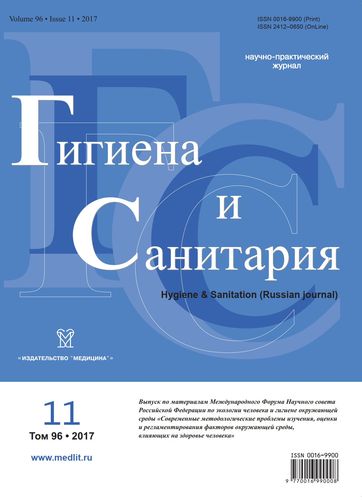About the health and environmental significance of blastocystis hominis in the system of state monitoring
- 作者: Kuznetsova K.Y.1,2, Shikhbabaeva F.M.3, Aslanova M.M.3,2, Rudinsky A.V.3, Zagaynova A.V.2
-
隶属关系:
- I.M. Sechenov First Moscow State Medical University
- Center for Strategic Planning and Management of Biomedical Health Risks
- Federal Center for Hygiene and Epidemiology of Rospotrebnadzor
- 期: 卷 96, 编号 11 (2017)
- 页面: 1097-1098
- 栏目: SOCIO-HYGIENIC MONITORING
- ##submission.datePublished##: 21.10.2020
- URL: https://rjsocmed.com/0016-9900/article/view/640745
- DOI: https://doi.org/10.47470/0016-9900-2017-96-11-1097-1098
- ID: 640745
如何引用文章
全文:
详细
There are presented data on the prevalence of blastocysts (Blastocystis hominis) in persons with clinical indications for examination and examined prophylactically. There is established a high level of infestation. Healthcare institutions are recommended to use special methods of laboratory diagnosis according to the standard of specialized medical care for irritable bowel syndrome. The relevance of the study is emphasized by WHO guidelines on the control of epidemic safety of water in terms of B. hominis. In Russia there are no official base for the observations for morbidity blastocysts and circulation of blastocysts in the environment.
作者简介
K. Kuznetsova
I.M. Sechenov First Moscow State Medical University; Center for Strategic Planning and Management of Biomedical Health Risks
编辑信件的主要联系方式.
Email: noemail@neicon.ru
俄罗斯联邦
F. Shikhbabaeva
Federal Center for Hygiene and Epidemiology of Rospotrebnadzor
Email: noemail@neicon.ru
俄罗斯联邦
Marya Aslanova
Federal Center for Hygiene and Epidemiology of Rospotrebnadzor; Center for Strategic Planning and Management of Biomedical Health Risks
Email: aslanova-mariya@mail.ru
MD, senior researcher of the Laboratory of Sanitary Bacteriology and Parasitology of the Center for Strategic Planning and Management of Biomedical Health Risks, Moscow, 119991, Russian Federation.
e-mail: aslanova-mariya@mail.ru
俄罗斯联邦A. Rudinsky
Federal Center for Hygiene and Epidemiology of Rospotrebnadzor
Email: noemail@neicon.ru
俄罗斯联邦
A. Zagaynova
Center for Strategic Planning and Management of Biomedical Health Risks
Email: noemail@neicon.ru
俄罗斯联邦
参考
- Balakina N.N., Zvyagina L.M., Zenin B.A. The role of microbial flora of the intestine in the occurrence of allergic dermatoses. Vestnik dermatologii i venerologii. 1983; (4): 56–9. (in Russian)
- Baranovskiy A.Yu., Kondrashina E.A. Dysbacteriosis and Intestinal Dysbiosis [Disbakterioz i disbioz kishechnika]. St. Petersburg: Piter; 2000. (in Russian)
- Belova L.M. Survival of the blastocyst outside the host organism. Parazitologiya. 1998; 32(2): 180–3. (in Russian)
- Belova L.M. World fauna and morphofunctional organization of blastocysts. Trudy Zoologicheskogo instituta RAN. 1992; 224: 53. (in Russian)
- Belova L.M. Fauna of Blastocystis II. Parazitologiya. 1995; 29(3): 208–13.
- Bondarenko V.M., Boev B.V., Lykova E.A., Vorob’ev A.A. Dysbacteriosis of the gastrointestinal tract. Rossiyskiy zhurnal gastroenterologii, gepatologii, koloproktologii. 1999; (1): 66–70. (in Russian)
- Gritsyuk O.V., Prodeus T.V., Maksimova M.S., Sadykova V.D. On the variability of isolates of Blastocystis species, supported in vitro. Meditsinskaya parazitologiya i parazitarnye bolezni. 2016; (3): 12–7. (in Russian)
- Guidelines for the quality of drinking water. Т.1 Recommendations. Geneva: WHO; 2004.
- The website of the World Health Organization. Available at: http://www.who.int/en/
- Sergiev V.P. The true and recorded incidence. Meditsinskaya parazitologiya i parazitarnye bolezni. 1991; (2): 3. (in Russian)
- Sergiev V.P., Kuznetsova K.Yu. Modern problems in the field of parasitic diseases and their therapy. Infektsionnye bolezni: novosti, mneniya, obuchenie. 2014; (1): 12–6. (in Russian)
- Tonkin D.V., Genov G., Dmitriev Kh. Parasitological studies in some skin diseases. Vestnik dermatologii i venerologii. 1986; 62(5): 39–40. (in Russian)
补充文件







